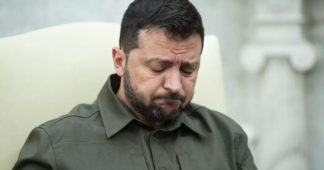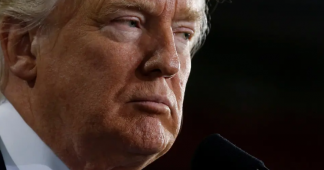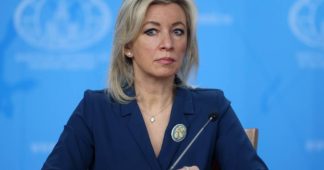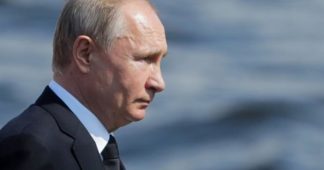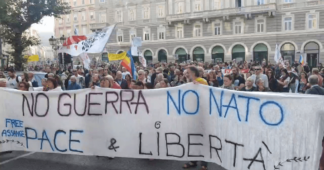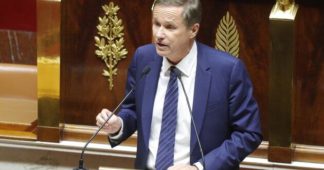Jul 27, 2024
Donald Trump has bragged that he could end the Russia-NATO proxy war in Ukraine with a couple phone calls, saying his main priority is to stop “people dying.” The GOP nominee for VP, JD Vance, has talked about the conflict’s cost to taxpayers. But there are many figures in the Republican establishment looking to prolong the crisis at all cost.
Former CIA director and secretary of state Mike Pompeo has outlined a neocon Republican playbook for the Ukraine crisis in the event that Donald Trump returns to office, calling for a rebranding of US military and economic assistance to Kiev as “lend-lease,” and inviting Kiev into NATO “as soon as possible so all European allies assume the burden of protecting it.”
Pompeo’s proposal, entitled “A Trump Peace Plan for Ukraine,” assures that Trump’s return to the presidency would not mean stopping Ukraine funding or negotiating directly with Moscow to end the fighting. On the contrary, he suggested, a Trump administration would pursue a “strategy for victory” that’s lacking in the current administration.
The neocon plan proposes a global effort led by the US and partners in the Middle East to bring down energy prices and “squeeze” Russia out of energy markets, imposing “real sanctions” on Moscow to replace the current “good on paper but…hollow” ones Pompeo says are in place today, ramping up NATO defense spending to a minimum of 3 percent of GDP, and lifting “all restrictions on the type of weapons Ukraine can obtain and use” against Russia.
Central to Pompeo’s plan is the proposal for a $500 billion “lend-lease” program for Kiev, which, in his words, “instead of saddling US taxpayers with more bills,” would “let Ukraine borrow as much as it needs to buy American weapons to defeat Russia.” This, he claimed, would “send a clear signal to Mr. Putin that he will never win.”
Pompeo’s vision for a post-conflict Ukraine includes building up Kiev’s military potential against Russia, refusing to recognize Russia’s new territories, “demilitarizing” Crimea (whatever that means), giving seized Russian Central Bank assets to Kiev, and inviting Ukraine into the European Union.
Pompeo did not elaborate on how a second Trump administration might achieve any of these goals. Moscow has stressed that it would never accept Ukraine in NATO, and the recently leaked peace deal that was agreed in the spring of 2022 (and sabotaged by the West before it could be realized), signaled demands by Russia that Ukraine limit the size of its military, recognize the Donbass Republics, repeal discriminatory language laws, ban the glorification and propaganda of Nazism and neo-Nazism, and (together with its Western patrons) scrap sanctions.
Pompeo’s treatise, penned together with lobbyist, CNN commentator and Trump 2016 campaign advisor David Urban, strikes a decidedly more aggressive tone than the former president or his pick for vice president, JD Vance, have taken on the campaign trail.
Trump has repeatedly promised to stop “the horrible war with Russia and Ukraine,” vowing to start the peace process on election night if he wins, but has remained light on the details of how he might achieve this goal. People familiar with the plan have reportedly said that it will include pressuring Kiev to give up territory, sparking panic among some at the Pentagon and neocons in both parties that such Ukrainian concessions would mean “Putin would win.”
Trump said last week that he had a “very good phone call” with Volodymyr Zelensky, and that Zelensky had “congratulated” him on becoming the Republican nominee and surviving his recent assassination attempt. “We agreed with President Trump to discuss at a personal meeting what steps can make peace fair and truly lasting,” Zelensky said in a follow-up social media post.
Zelensky got in trouble with Republicans earlier this month over comments in a CNN interview from earlier this year in which he suggested that JD Vance doesn’t understand the situation in Ukraine, and that Kiev doesn’t “need any rhetoric from people who are not deeply in the know.”
Vance, who has positioned himself as an America First Republican, argued in an op-ed in the New York Times in April that the biggest reason the US shouldn’t continue to support Ukraine is a basic “math” problem revolving around the fact that “Ukraine needs more soldiers than it can field, even with draconian conscription policies,” and “needs more materiel than the United States can provide.”
Vance has also said that the argument by proponents of further military support to Kiev on the basis that it would help the US economy and create jobs was morally deficient. “The notion that we should prolong a bloody and gruesome war because it’s been good for American business is grotesque,” he wrote, saying that “the sooner Americans confront” the mathematical “truth” that Ukraine can’t win, “the sooner we can fix this mess and broker for peace.”
Which path Trump may take on Ukraine – the one proposed by Pompeo or the one outlined by Vance, remains unclear. During his first term in office, Trump staffed his administration with avowed neocons including Pompeo, John Bolton and Nikki Haley. At the same time, the president demonstrated that he had a preference for de-escalation, expressing pride in his January 2021 farewell address that he was “the first president in decades with no new wars.” Trump was also credited for avoiding being dragged into an all-out war with Iran in 2019 and 2020 on the advice of friendly conservative non-interventionist figures, first and foremost Tucker Carlson.
Trump has already fallen for the neoconservative “lend-lease for Ukraine” argument once earlier this year, endorsing a $61 billion aid package which had been blocked for months by conservative House Republicans, after suggesting that part of the aid could be classified as a repayable loan.
The loan idea was lobbied heavily by Lindsey Graham, another top neocon in Washington. Graham blasted Vance over his NYT op-ed, echoing Zelensky’s talking points and claiming that if Washington wants “American military members to stay out of the fight with Russia,” it should “help Ukraine.”
We remind our readers that publication of articles on our site does not mean that we agree with what is written. Our policy is to publish anything which we consider of interest, so as to assist our readers in forming their opinions. Sometimes we even publish articles with which we totally disagree, since we believe it is important for our readers to be informed on as wide a spectrum of views as possible.
